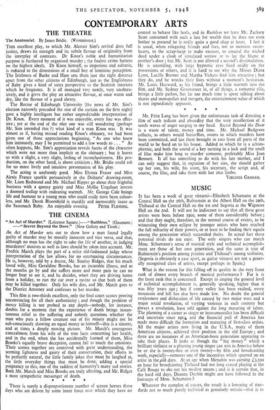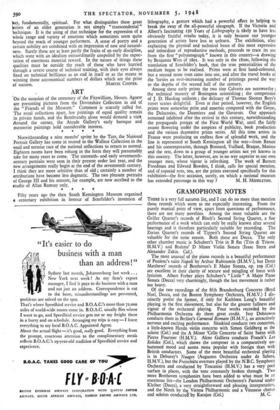MUSIC
IT has been a week of great virtuosi—Elizabeth Schumann at the Central Hall on the 26th, Rubinstein at the Albert Hall on the 29th, Thibaud at the Central Hall on the 1st and Segovia at the Wigmore Hall on the 2nd. It will not be indiscreet to say that all these great artists were born before 19oo, some of them considerably before ; and that they ought, therefore, in the normal course of events, to be witnessing their own eclipse by younger artists who have reached the full maturity of their powers, or at least to be finding their equals among the generation which succeeded theirs. In actual fact these potential rivals do not exist. The only singers who can match Mme. Schumann's sense of musical style and technical accomplish- ment are those of her own generation, and the same is true of Rubinstein's position among pianists• and Thibaud's among violinists. (Segovia is obviously a case apart, as guitar virtuosi are not a gener- ally recognised class of artists, except perhaps in Spain.)
What is the reason for this falling off in quality in the very front rank of almost every branch of musical performance ? For it is the front rank that is concerned. Except in singing the general level of technical accomplishment is, generally speaking, higher than it was fifty years ago ; but if every valley has been exalted, every mountain and hill has also been made low. No doubt the general restlessness and dislocation of life caused by two major wars and a major social revolution, of varying violence in each country but always a revolution, have told against the long maturing of talent. The planning of a career as singer or instrumentalist has been difficult and uncertain since 1914, and the financial pull of America has made more difficult the formation and maturing of first-class artists. All the major artists now living in the U.S.A., many of them American citizens, achieved their position in the old Europe ; and there are no instances of an American-born generation appearing to take their places. It looks as though the " big money " which a brilliant violinist or a pleasing young singer can win in America before he or she is twenty-five or even twenty—by film and broadcasting work, especially—removes one of the incentives which spurred on an artist in the,old days. At an age when Menuhin was earning £3,500 an hour for broadcasting Thibaud had not long ceased playing at the Café Rouge to eke out his modest means ; and is it certain that, in the hard old days, Deanna Durbin might not have followed in the footsteps of Mme. Schumann ?
Whatever the complex of causes, the result is a lowering of stan- dards not so much purely technical as genuinely artistic—that is to
!say, fundamentally, spiritual. For what distinguishes these great an older generation is not simply lutists of " transcendental " 'technique. It is the using of that technique for the expression of a whole range and variety of emotions which sometimes seem quite beyond the reach of younger performers. A sense of poetry and a certain nobility are combined with an impression of ease and natural- ness. Surely these are at least partly the fruits of an early discipline,
an
which went with idealism extraordinarily unspoiled by the expec- tation of enormous material reward. In the nature of things these be outside the reach of those who qualities must have hurried through a severe course of technical training, with their eyes always fixed on technical brilliance as an end in itself or as the means to winning those astronomical numbers of dollars which are the prize











































 Previous page
Previous page